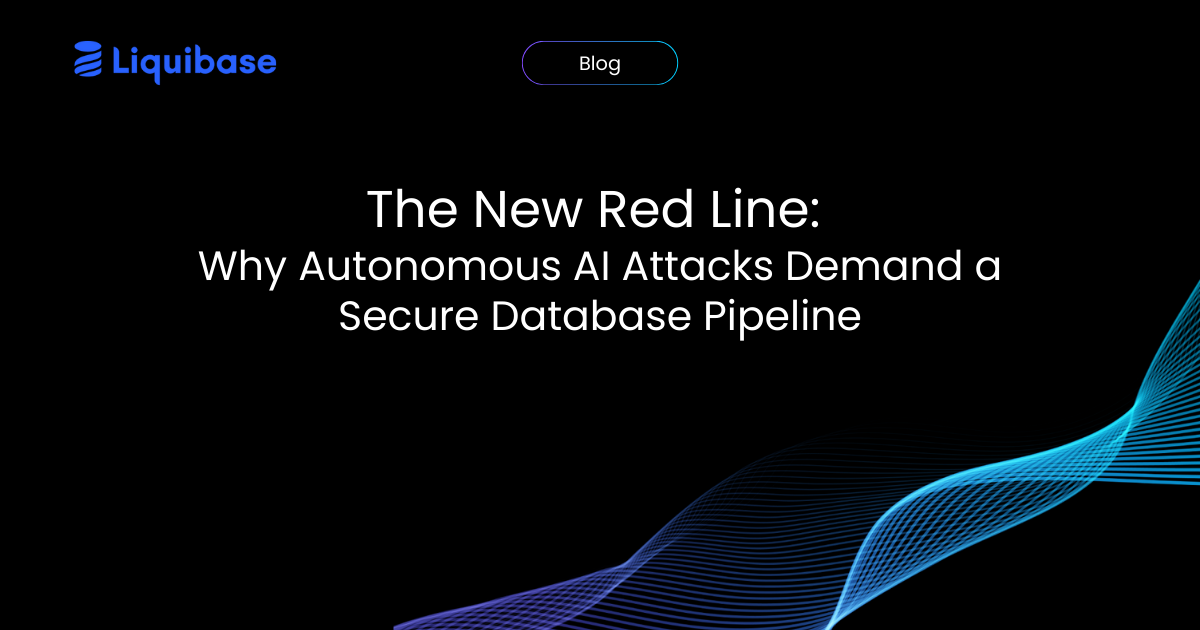Why Financial Services Leaders Are Re-Evaluating Open Source for Database Change Management
How new compliance pressures are driving CTOs to enterprise-grade solutions for database change management.
August 6, 2025
See Liquibase in Action
Accelerate database changes, reduce failures, and enforce governance across your pipelines.

Key Take Aways
Open source solutions (OSS) have been a go to choice for banks and financial services companies for years. They can help reduce cost as banks move away from proprietary systems that carry a hefty maintenance burden. However, as banks increasingly realize the security, compliance, and integration work that comes with OSS, many institutions are turning to commercial options that have the right mix of interoperability, platform benefits, SLAs and support structures to help them be successful.
When examining this choice, banks and financial institutions should consider:
- The audit readiness costs of operating OSS
- Potential blindspots in systems and observability
- The risks associated with supporting OSS security
- Benefits of standardization, support, and SLAs to help operationalize database DevOps at scale
Introduction
“The financial repercussions of non-compliance are approximately 2.71 times greater than the costs of maintaining robust compliance programs.”
Financial services organizations are under increasing pressure to ensure security, transparency, and accountability across every layer of their technology stack. As compliance demands grow increasingly more complex, many CTOs and technology leaders are taking a hard look at the tools and processes they’ve relied on for managing database changes.
For years, open source solutions (OSS) have played a central role in DevOps and database operations, thanks to flexibility, low cost, and global community support. But amid heightened regulatory scrutiny, operational risk, and the need for rigorous auditability, open source tools alone are no longer hitting the mark. According to Ascent AI, since 2016, the evolution of regulatory compliance has seen a 61% rise in employee hours spent on regulatory activities and examiner mandates.
While OSS is ideal for users who value flexibility, autonomy, and control, they’re becoming a riskier bet for regulated industries. Not only do OSS tools require far more effort to set up, there’s a much higher technical investment involved, and tradeoffs in advanced features and support. Financial institutions are starting to re-evaluate their reliance on OSS database change management tools and in favor of enterprise-grade solutions that offer the security, governance, and support needed to meet modern compliance standards.
Liquibase is trusted by some of the world’s largest financial organizations to help them stay ahead of both innovation and regulation. Not only is it one of the fastest growing open source projects in the world, it is the de facto standard for Database DevOps, with 100 million downloads, and 5,000 GitHub Stars since 2006.
In this ebook, we’ll explore the rising compliance and operational risks of open source, and why enterprise-grade tools like Liquibase Secure are becoming essential for financial services firms aiming to scale securely.
The Compliance Burden of Unsupported Open Source in Financial Services
IBM reports that “88% of data breaches are caused by human error” – underscoring the need for automated, policy-driven approaches to database change management.
In financial services, compliance demands are mounting – from SOX and GDPR, to PCI DSS and evolving data privacy laws. Internal teams must not only implement controls but also prove they’re enforced, versioned, and fully auditable. At the same time, they’re expected to maintain a strong security posture through rigorous patching, code reviews, and process governance. Much of this responsibility falls on engineers who are already stretched to their limits.
Audits often become major time sinks when teams rely on spreadsheets, custom scripts, and screenshots. Manual compliance is not just inefficient, it’s brittle and prone to error. Fortunately, a more scalable path exists. Gartner notes that “companies with integrated database version control and CI/CD pipelines cut time spent on compliance audits by 50%.”
Liquibase Secure helps make that possible by enforcing database policies in code, auto-generating audit-ready logs, and validating changes before deployment. With built-in compliance capabilities, it empowers teams to meet regulatory requirements with confidence, while easing the burden on overworked engineering teams.
Use Case: Imagine a CTO facing a surprise regulatory audit. Relying purely on OSS tools, their team scrambles to piece together change logs from disparate systems. Instead, leveraging Liquibase Secure, it’s just one click to generate a complete, validated change history – fully auditable and compliant.
.png)
Why Automation and Audit Readiness Are Now Non-Negotiable
Manual workflows significantly increase operational risk, particularly in complex, multi-database environments where tracking changes is error-prone. Tool sprawl and a lack of standardization can lead to inconsistent deployments, unplanned downtime, and failed audits. In fact, research from Redgate shows that organizations automating database deployments experience a 70% reduction in deployment errors.
This aligns with 2023 findings from DORA, which reports that teams adopting DevOps practices deploy changes 47 times more frequently and recover from failures 96 times faster – highlighting the efficiency gains of automation. However, without integrated safeguards, these same practices can also raise the risk of uncontrolled changes.
Auditability is another critical factor: incomplete or inconsistent records are red flags during audits, and unsupported open source tools often require teams to manually piece together change histories – an error-prone and unreliable process.
Liquibase Secure solves these problems with granular audit trails, policy enforcement at every stage, and automated validation and rollback controls – taking the burden off developers and helping leaders sleep more peacefully!
Use Case: A CTO who uses open source tooling is preparing for an annual compliance review. They discover inconsistent tracking across development and staging environments, and must scramble to attest to compliance. With Liquibase Secure, all environments follow the same automated workflows – ensuring consistent, provable compliance.
Hidden Tech Debt Associated with OSS
Organizations that rely on OSS software within the environment, may face mounting tech debt as the need to manage the OSS version and all its changes becomes more acute. This can happen if there is a change in the way that OSS is supported, the community that supports the OSS version is not engaged, or organizations remain on older, unsupported versions.
Here are some of the ways that can translate into mounting tech debt:
- Managing extensions and Drivers: OSS users frequently need to manage dependencies like extensions and driver updates themselves, adding them as needed through a package manager. This could require adjusting build configurations or scripts that relied on the previously bundled components. While this may seem manageable for one or two components, imaging the burden of handling scores or even hundreds of driver updates.
- Increased Wiring and Customization: Leaner OSS packages often run a more modular toolkit which necessitates more "wiring" and customization for features that were previously available "out of the box." This might affect projects with custom scripts or wrappers that interacted with the previous architecture.
- Lack of support, SLAs, and security updates: While the core functionality of OSS can be attractive for users that are primarily cost driven, users who need advanced features like SLA-backed support, security, or broader database ecosystem support may find themselves scrambling when things go wrong. Relying on the community for things like critical security updates may mean that institutions are waiting more than 30 days for a security fix they then need to integrate and test. The average to deploy an OSS security fix, even a critical one, can exceed 98 days or more.
Choosing Enterprise-Grade Support for Secure, Reliable Database Operations
While open source software may appear cost-effective at first, it often comes with hidden expenses, such as downtime from integration issues, delays in applying critical patches, and the risk of regulatory penalties due to noncompliance. All of these challenges place additional strain on already overburdened IT teams.
Enhancing OSS tools with enterprise-grade features unlocks access to reliable support, validated integrations, and expert guidance – helping to reduce both operational risk and the workload on the team. As Forrester notes: “Adopting standardized tools across teams for database change management increases developer productivity by 40%.”
Liquibase Secure aims to unburden teams with pre-tested integrations and drivers, governance tools to standardize change processes, and expert guidance to reduce risk and optimize performance.
Use Case: A global financial firm managing teams across multiple regions needs secure, synchronized deployments across Oracle, PostgreSQL, and SQL Server. Liquibase Secure offers the tooling, support, and standardization to make that possible at scale, without the headache.
Case in Point: Banking
Liquibase, in use at 9 out of the Fortune 10 U.S. Banks. One of the larger financial institutions added Liquibase as a core component of their DevSecOps push. Transforming its chaotic, error-prone approach to managing database changes, the bank improved speed, efficiency, scalability and governance as it automated more than 30 pipelines.
By standardizing on Liquibase to automate database change management and safeguard data integrity, Liquibase became the central part of the bank’s DevSecOps program extending security, automation and operational excellence to the database layer. This change resulted in 85% fewer manual review cycles, 80% less DBA effort, 8X faster and more frequent deployments.
Conclusion
With the burden of compliance rapidly growing and ever-evolving, financial services organizations are under immense pressure to ensure security, transparency, and accountability across every layer of their technology stack. OSS tools have powered database change management for many years, but we are fast reaching a tipping point where the flexibility and cost of OSS is far outweighed by the risks involved. Leaders who want to future-proof their stack should consider the long-term impact of their database strategy on compliance, audit readiness, and operational resilience.
Leveraging open source projects in your organization? Remember:
- Compliance automation: OSS places the burden on internal teams; Liquibase Secure builds compliance into every workflow.
- Operational efficiency: Automation reduces errors, accelerates delivery, and cuts audit prep time in half.
- Enterprise support: Liquibase Secure offers tested integrations, expert help, and built-in governance.
Compliance and speed must coexist, so vote for enterprise-grade solutions that deliver both.
Your database strategy is no longer just about deployments – you must ensure resilience, audit readiness, and trust.
Ready to see Liquibase Secure in action?
Frequently Asked Questions
Q1. How does Liquibase Secure compare to open-source alternatives for compliance and support?
A1: Liquibase Secure delivers automated compliance, robust audit trails, and expert support—reducing internal workload and regulatory risk compared to unsupported OSS.
Q2. Can Liquibase Secure be integrated with our existing DevOps and CI/CD workflows?
A2: Yes. Liquibase Secure integrates with leading CI/CD platforms, supports pre-tested drivers, and fits seamlessly into modern DevOps pipelines.
Q3. What does onboarding and implementation look like for a large financial services organization?
A3: Liquibase offers dedicated onboarding support, expert training, and proven frameworks—typically getting enterprise teams fully operational in weeks, not months.



.png)

.png)
.png)

.png)





